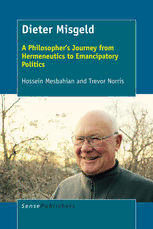
Dieter Misgeld: A Philosopher’s Journey from Hermeneutics to Emancipatory Politics PDF
Preview Dieter Misgeld: A Philosopher’s Journey from Hermeneutics to Emancipatory Politics
Dieter Misgeld Dieter Misgeld A Philosopher’s Journey from Hermeneutics to Emancipatory Politics Hossein Mesbahian University of Tehran, Iran and Trevor Norris Brock University, St. Catharines, Ontario, Canada A C.I.P. record for this book is available from the Library of Congress. ISBN: 978-94-6300-930-0 (paperback) ISBN: 978-94-6300-931-7 (hardback) ISBN: 978-94-6300-932-4 (e-book) Published by: Sense Publishers, P.O. Box 21858, 3001 AW Rotterdam, The Netherlands https://www.sensepublishers.com/ All chapters in this book have undergone peer review. Cover photograph (front) by Carly Stasko Printed on acid-free paper All Rights Reserved © 2017 Sense Publishers No part of this work may be reproduced, stored in a retrieval system, or transmitted in any form or by any means, electronic, mechanical, photocopying, microfilming, recording or otherwise, without written permission from the Publisher, with the exception of any material supplied specifically for the purpose of being entered and executed on a computer system, for exclusive use by the purchaser of the work. TABLE OF CONTENTS Acknowledgements vii Introduction 1 Chapter 1: Life and Works 17 Chapter 2: Gadamer and Hermeneutics 77 Chapter 3: Habermas and Modernity 105 Chapter 4: Postmodernity 135 Chapter 5: Rorty and Neopragmatism 145 Chapter 6: Education 151 Chapter 7: West/East: Clash or Dialogue? 169 Chapter 8: Canada and the World 179 Chapter 9: Third World Perspective 199 Chapter 10: Human Rights 217 Chapter 11: Closing Thoughts on Philosophy 227 Appendix I: “The Distinctiveness of Europe, the Geisteswissenschaften and a Global Society: Reflections on Some Recent Writings by Hans-Georg Gadamer,” by Dieter Misgeld 233 Appendix II: Dieter Misgeld’s Retirement Speech 249 Appendix III: Selected Bibliography of Dieter Misgeld 261 About the Authors 267 v ACKNOWLEDGEMENTS The authors would like to express their gratitude towards Dieter Misgeld for his time and willingness – mixed with a healthy humility – in agreeing to participate in this project. vii INTRODUCTION Professor Dieter Misgeld taught Philosophy of Education at the Ontario Institute for Studies in Education at the University of Toronto for over thirty years. When we first arrived at OISE as graduate students, considerable mystique already surrounded Professor Misgeld. Many attested to his brilliance, range of knowledge, and at times intimidating personality. But there was also considerable curiosity about his intellectual shifts and what led him to turn away from philosophy. As described by the former chair of the philosophy program, “[F]or the first fifteen years when Dieter arrived in the philosophy of education group, he continually berated us for not being philosophical enough. For the last fifteen, he accused us all of being too philosophical.”1 We were intrigued by how someone who had received such an exceptional education from thinkers who have shaped much of 20th century thought could eventually turn away from philosophy and describe it as no longer useful. It is this transformation that we sought to understand. Philosophical biographies are not new; there are countless biographies about all of the great philosophers in history. They are sought out for their capacity to cast light on the person behind the ideas, the key transitions in their thought, and the ways in which life experiences impact intellectual development. What emerges from their study is the grounding of thought in the personal character of philosophical reflection, and the drama of ideas as they unfold throughout a lifetime. Philosophical biographies are certainly not as exciting or dramatic as the lives of military leaders or political figures, adventurers and explorers. Perhaps the most extreme and famous example of this is Immanuel Kant, who never in his life ventured far from his village. It is said that townspeople and shopkeepers could set their clocks by the predictable routine of his daily walks. Every thinker invariably goes through changes. To speak otherwise would imply that a thinker establishes their philosophical position as fixed and unchanging, based on reference to a permanent Archimedean point from which to view the world. This is characteristic of an age that is dominated by the assumption that knowledge and human understanding is contingent on distance and impartiality and the removal of human interests from the knowing process. Only philosophy under the influence of modern science would suggest that we can know the objects of human thought better as the knower moves away from them rather than through personal involvement. For insofar as philosophy is based on subjective experience and particular perspectives rather than unalterable positivistic method, positions will invariably shift through time. Misgeld is quite an unconventional thinker—not the usual leftist or radical, yet not at all rightist; not a conventional secular thinker, yet not an anti-religious Marxist. He was not in any way a typical philosopher or writer, but had a role 1
